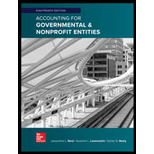
A county government and a legally separate organization—the Sports Stadium Authority—entered into an agreement under which the authority issued revenue bonds to construct a new stadium. Although the intent is for the authority to make debt service payments on the bonds from a surcharge on ticket sales, the county agreed to annually advance the Sports Stadium Authority the required amounts to make up any debt service shortfalls and has done so for several years. Accordingly, the county has recorded a receivable from the authority and the authority has recorded a liability to the county for all advances made under the agreement.
Ticket surcharge revenues that exceed $1,500,000 are to be paid to the county and to be applied first toward interest and then toward principal repayment of advances. Both parties acknowledge, however, that annual ticket surcharge revenues may never exceed $1,500,000 because reaching that level would require an annual paid attendance of 3,000,000. Considering that season ticket holders and luxury suite renters are not included in the attendance count, it is quite uncertain if the required trigger level will ever be reached.
The authority has twice proposed to raise the ticket surcharge amount, but the county in both cases vetoed the proposal. Thus, the lender in this transaction (the county) has imposed limits that appear to make it infeasible for the borrower (the authority) to repay the advances. Consequently, the authority’s legal counsel has taken the position that the authority is essentially a pass-through agency with respect to the advances in that the authority merely receives the advances and passes them on to a fiscal agent for debt service payments. Moreover, they note that the bonds could never have been issued without the county’s irrevocable guarantee of repayment because all parties knew from the beginning that the authority likely would not have the resources to make full debt service payments.
Based on the foregoing considerations, the authority’s legal counsel has rendered an opinion that the liability for the advances can be removed from the authority’s accounts. The county tacitly agrees that the loans (advances) are worthless because it records an allowance for doubtful loans equal to the total amount of the advances. Still, the county board of commissioners refuses to remove the receivable from its accounts because of its ongoing rights under the original agreement for repayment.
Required
- a. Assume you are the independent auditor for the authority, and provide a written analysis of the facts of this case, indicating whether or not you concur with the authority’s decision to no longer report the liability to the county for debt service advances.
- b. Alternatively, assume you are the independent auditor for the county and, based on the same analysis you conducted for requirement a, indicate whether or not you concur with the county continuing to report a receivable for debt service advances on its General Fund
balance sheet and government-wide statement of net position.
Want to see the full answer?
Check out a sample textbook solution
Chapter 6 Solutions
Accounting For Governmental & Nonprofit Entities
- Need correct answer general accounting questionarrow_forwardNonearrow_forwardA supplier offers credit terms of 2/10, net 30, meaning a 2% discount is available if payment is made within 10 days. If a company purchases $12,000 worth of goods and pays within 7 days, calculate the amount paid after applying the discount.arrow_forward

 AccountingAccountingISBN:9781337272094Author:WARREN, Carl S., Reeve, James M., Duchac, Jonathan E.Publisher:Cengage Learning,
AccountingAccountingISBN:9781337272094Author:WARREN, Carl S., Reeve, James M., Duchac, Jonathan E.Publisher:Cengage Learning, Accounting Information SystemsAccountingISBN:9781337619202Author:Hall, James A.Publisher:Cengage Learning,
Accounting Information SystemsAccountingISBN:9781337619202Author:Hall, James A.Publisher:Cengage Learning, Horngren's Cost Accounting: A Managerial Emphasis...AccountingISBN:9780134475585Author:Srikant M. Datar, Madhav V. RajanPublisher:PEARSON
Horngren's Cost Accounting: A Managerial Emphasis...AccountingISBN:9780134475585Author:Srikant M. Datar, Madhav V. RajanPublisher:PEARSON Intermediate AccountingAccountingISBN:9781259722660Author:J. David Spiceland, Mark W. Nelson, Wayne M ThomasPublisher:McGraw-Hill Education
Intermediate AccountingAccountingISBN:9781259722660Author:J. David Spiceland, Mark W. Nelson, Wayne M ThomasPublisher:McGraw-Hill Education Financial and Managerial AccountingAccountingISBN:9781259726705Author:John J Wild, Ken W. Shaw, Barbara Chiappetta Fundamental Accounting PrinciplesPublisher:McGraw-Hill Education
Financial and Managerial AccountingAccountingISBN:9781259726705Author:John J Wild, Ken W. Shaw, Barbara Chiappetta Fundamental Accounting PrinciplesPublisher:McGraw-Hill Education





